Special Events:
- 2012 - August
Festa italiana. “On Italian Opera: Home and Abroad.”
An illustrated Lecture, as a prelude to the evening’s concert performance of Traviata. Labatt Room, at 2:45. London, Ontario, August 26. http://www.coventmarket.com/festa-italiana-august-24th-26th/
- 2012 - July
“ŽIVLJENSKI JUBILEJ – Damjana Bratuž. Z glasbo po svetu.” This article (in Slovenian) entitled ”A LIFE’S JUBILEE - Damjana Bratuž. With Music Around the World” appeared in a daily newspaper in Damjana’s home town, Gorizia/Gorica, on July 31 2012. It was written by renowned author, documentary film director, and journalist, Dorica Makuc. It celebrates the accomplishments of the musician, pedagogue, and lecturer, who has remained faithful to the memory of her family’s sufferings and has received in 2011 the honorary citizenship of the city of Urbisaglia.
In one of the pictures appearing in the article, Damjana is shown with celebrated composer and painter Cecilia Seghizzi, her Theory and Music History teacher of the 1940s who is now 103 years old. Damjana visited her in 2011 at her summer residence in Grad.
- 2011 - August/ September
A lengthy interview with musicologist and journalist Tatjana Gregorič taped last August in Gorizia, Italy, was broadcast four times in four different sections: the one devoted to Urbisaglia on Radio Koper, on August 27; another one on Radio Koper on September 9 in the program 'Open for Encounters;' then on Radio Slovenia, on September 10, in the program 'Artists at the microphone;' and on September 26, in the program 'Slovenians around the World.'
The broadcasts inspired several listenrs to call and congratulate.
- 2011 - July
The Honorary Citizenship of Urbisalgia is being awarded to Damjana Bratuz in memory of her father Rudolf, who in 1941-42 was interned in the nearby Campo di Concentramento.
See Urbisaglia 2011
- 2011 - May
Snovanja 2011, Emil Komel in njegovi učenci
At the Cultural Centre Lojze Bratuž in Gorizia, Italy, an evening was devoted on May 13 to the memory of a prominent local musician, organist and composition teacher Emil Komel. The organizer of the event, musicologist Tatjana Gregorič, invited Damjana Bratuž to send from Canada her own reminiscences, which were read at the event by a young colleague. The program, with the participation of eminent musicians including conductor Anton Nanut, and prof. Ivan Florjanc, was recorded by Radio Trieste-A.
The text is in Slovenian. An English translation is forthcoming
See Spominski Večer - Emil Komel
Presentations:
- 2013 - Université catholique de Louvain, Belgium. Paper: “Bartók’s Improvisations for Piano: a Musical Frontier.”
- 2013 - University of Toronto. PowerPoint presentation: “On the Translation of Musical Experience: Luciano Berio’s Sequenze.”
- 2012 - Halifax, Nova Scotia. Paper: “On Some Varieties of Human Oppression.”
- 2012 - London, Ontario. The London Opera Guild. The Feminine Side of the Musical Mind. Kaija Saariaho: L’amour de loin/Love from Afar.
- 2011 - London, Ontario. University of Western Ontario. ARIO (Associazione Ricercatori Italiani dell'Ontario). Luciano Berio
- 2011 - London, Ontario. Centre for the Study of Theory and Criticism, UWO. Parlando with Bartók and Bakhtin
- 2011 - London, Ontario. King's University College, UWO. Le connessioni invisibili / Invisible Connections Part II
- 2011 - Bertinoro / University of Bologna. International Bakhtin Conference. Parlando: On the Embodiment of Bartók's Dialogic Forms
- 2011 - London, Ontario, Invisible Connections: The Harvard Lectures of Bartók (1944) and Calvino (1985)
- 2009 - Groningen, The Netherlands, (Keynote Speaker) The Feminine Side of the Musical Mind
- 2009 - Amsterdam, The Netherlands, The “conferred” and the “inherent” meanings in ��Béla Bartók's notation
- 2009 - Toronto, Ontario, On the Persistence of an Iconic Misrepresentation:��Two Musical Examples by Béla Bartók
- 2009 - Toronto, Ontario, The Missing 32”:�Sotto il segno dell’orso (Under the Sign of the Bear)
- 2009 - London, Ontario, Singing in Italiano
- 2009 - London, Ontario, Sotto il segno dell’orso/Under the Sign of the bear: From Indication to Interpretation
- 2008 - Halifax, Influence and affinity: from Béla Bartók’s direct filiation to Umberto Eco’s primitive affinities.
- 2008 - Vilnius, Il suono che diventa significato/ Sound Becoming Sense: Listening to Luciano Berio.
- 2007 - Toronto, Luciano
Berio: “Quando
il suono diventa significato. On Sound Becoming
Sense.
- 2007 - Toronto, Bartók’s
Blunder: the Missing Frontier.
- 2006 - Rome, On the
Shaman’s Trail:
Béla Bartók’s Szabadban
- 2006 - Gorizia/Nova Gorica,
Béla Bartók
in Slovenske Meje
- 2006 - Bard College, N.Y.,
Rethinking Bartók’s
Boundaries
- 2005 - Washington D.C., Transgression
without Threshold: on the Missing, or Mistranslated
Bard’s Prologue
in Béla Bartók’s Duke Bluebeard’s
Castle
- 2005 - University of Calgary,
A World of Contrasts Commemorating the 60th Anniversary
of Bartók's
Death.
- 2004 - List of presentations given as a pianist
and lecturer
Presenter Package Easily Downloadable in PDF Format:
Download/view
Brochure -
in Adobe Acrobat (PDF) Format
Download/view
Brochure Insert - in Adobe Acrobat
(PDF) Format
 Get
a free copy of the Adobe Acrobat Reader Get
a free copy of the Adobe Acrobat Reader
Press:
Essays:
http://www.h-net.org/reviews/showrev.php?id=26105.
I thank Damjana Bratuž for her help with the "Italian Gould," including her thoughts on literal and cultural mistranslations that may account for past biographical confusion.

2013
Paper: “Bartók’s Improvisations for Piano: a Musical Frontier.” ICMS- 12, Music, Semiotics and Intermediality. Université catholique de Louvain, Louvain-la-Neuve, et Académie Royale de Belgique, Bruxelles. 2 - 6 avril.
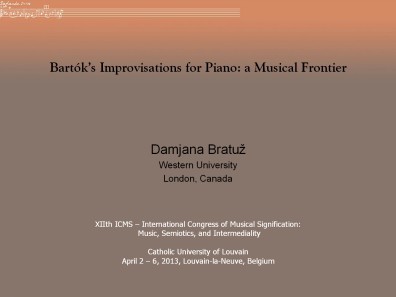
PowerPoint presentation: “On the Translation of Musical Experience: Luciano Berio’s Sequenze.” Emilio Goggio Lectures, Department of Italian Studies, University of Toronto. January 21.
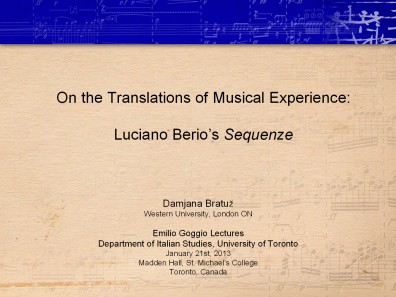
2012
Halifax, N.S., Paper: “On Some Varieties of Human Oppression.” 14th Biennial Conference, Association of Italian-Canadian Writers, www.aicw.ca Back to the Future: Possibilities Since Pier 21, March 23-25. Panel: Re-visiting the internments of the 1940s: A Multi-disciplinary Perspective (with Jim Zucchero and Antonio Calcagno (King’s University College, UWO). [In preparation]
London, Ontario. The London Opera Guild. The Feminine Side of the Musical Mind. Kaija Saariaho: L’amour de loin/Love from Afar.
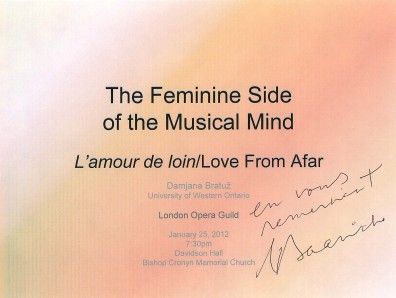
Signed by the composer.
2011
London, Ontario. University of Western Ontario. ARIO (Associazione Ricercatori Italiani dell'Ontario)
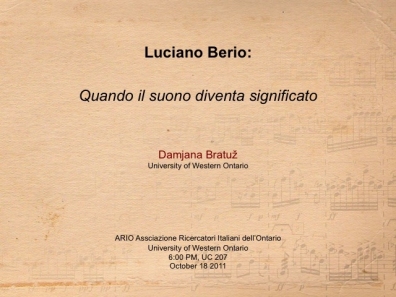
London, Ontario. Centre for the Study of Theory and Criticism, UWO. Parlando with Bartók and Bakhtin
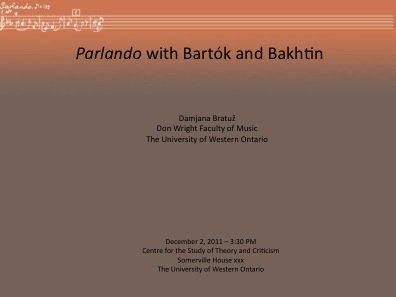
London, Ontario. King's University College, UWO. Le connessioni invisibili / Invisible Connections Part II
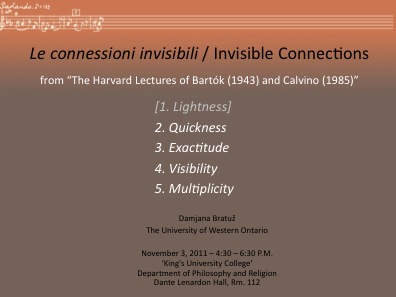
Bertinoro / University of Bologna. International Bakhtin Conference. Parlando: On the Embodiment of Bartók's Dialogic Forms
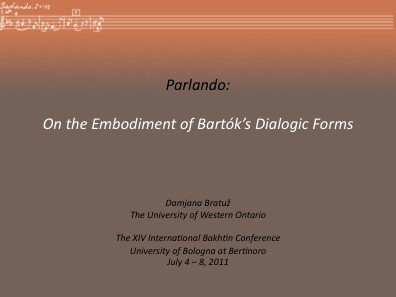
March 3
Invisible Connections: The Harvard Lectures of Bartók (1944) and Calvino (1985) - King's University College - Department of Philosphy and Religion, London Ontario. PowerPoint presentation.
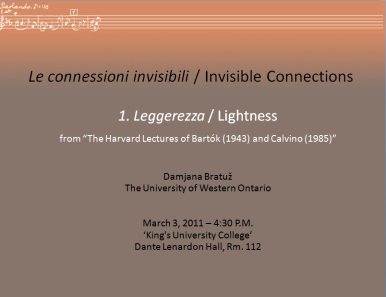
2009
November 12-13
International Conference: Representing Gender in the Performative Arts , University of Groningen, Groningen, The Netherlands. (Keynote Speaker) The Feminine Side of the Musical Mind.
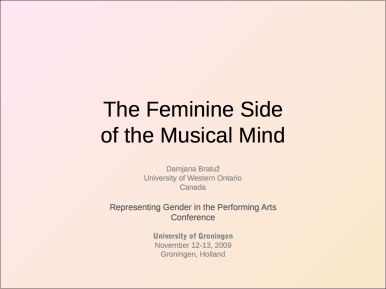
July 5-10
IMS SYMPOSIUM MUSIC: NOTATION AND SOUND IAML-IMS CONFERENCE The “conferred” and the “inherent” meanings in ��Béla Bartók's notation.
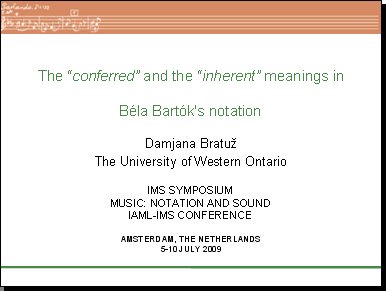
June 9-14
7th Symposium on Iconicity in Language and Literature Victoria University in the University of Toronto, Canada On the Persistence of an Iconic Misrepresentation: Two Musical Examples by Béla Bartók On the Persistence of an Iconic Misrepresentation:��Two Musical Examples by Béla Bartók
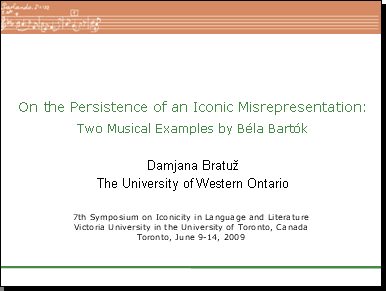
April 25
The Toronto Semiotic Circle, Northrop Frye Hall Victoria University in the University of Toronto The Missing 32":
Sotto il segno dell’orso
(Under the Sign of the Bear)
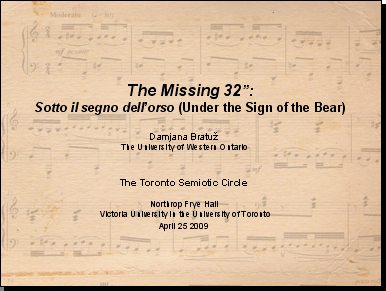
"Thank you so much for your fascinating and engaging talk on Saturday. I know the discussion could have continued for much longer because of the interesting aspects you brought up".
Dr. Anne Urbancic, Semiotics & Communication Theory, University of Toronto
March 20
Voice Fridays, Don Wright Faculty of Music, University of Western Ontario - Singing in Italiano (PDF format)
"This will be a treat! Prof. Bratuz is a delight and has much to teach us about singing in Italian… "
Torin W. Chiles Lecturer, Coordinator of the Voice Division Don Wright Faculty of Music University of Western Ontario
January 16
"12:30 Fridays" - Western, Don Wright Faculty of Music - Von Kuster Hall Sotto il segno dell’orso/Under the Sign of the bear: From Indication to Interpretation, January 16, 2009
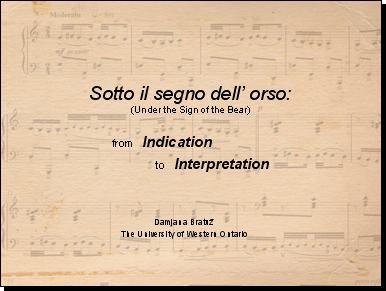
2008
November 16
52nd Annual Meeting of the Canadian Society for Traditional Music/ Jointly Meeting with the Helen Creighton Folklore Society. Saint Mary’s University, Halifax, Nova Scotia November 14th-16th, 2008
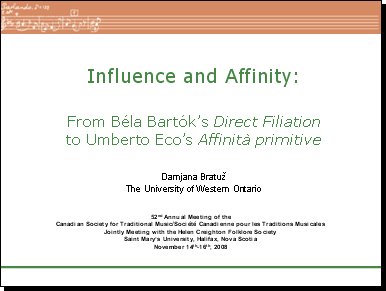
October 24
10th International Congress on Musical Signification, ICMS 10 - BEFORE AND AFTER MUSIC. Lithuanian Academy of Music and Theatre (Vilnius)
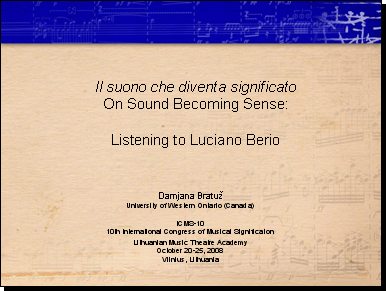
2007
January 25.
Lecture: Luciano Berio: “Quando il suono diventa significato. On
Sound Becoming Sense.” University of Toronto, Department of Italian Studies
With the participation of Joseph Petric, concert accordion
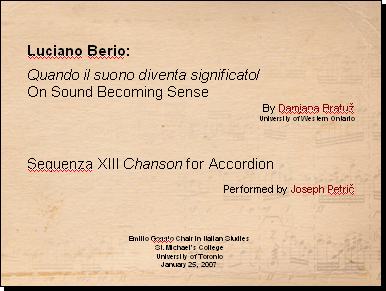
February 17.
Colloquium Paper:”Bartók’s Blunder: the Missing Frontier.” The
Toronto Semiotic Circle. Victoria College, Northrop Frye Hall.
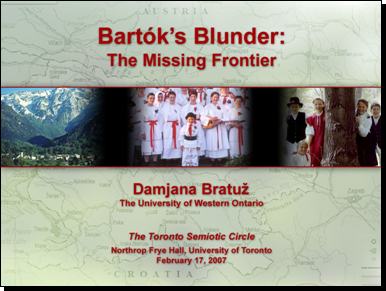
2006
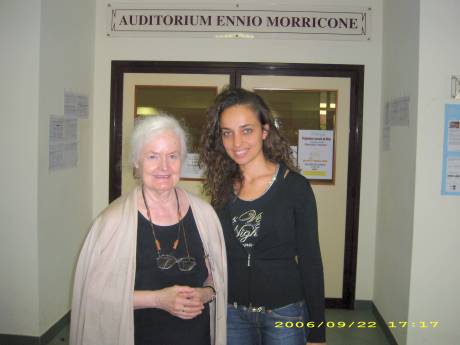
Ninth International Congress on Musical
Signification
19-23 September 2006 – Università di
Roma Tor Vergata Facoltà di Letter e Filosofia
"MUSIC,
SENSES, BODY” “LA MUSICA, I SENSI, IL CORPO"
On
the Shaman’s Trail: Béla Bartók’s
Szabadban
(Power Point Presentation)
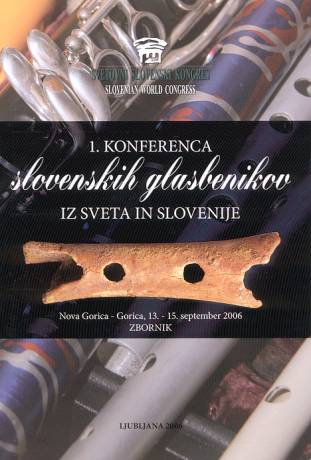
Slovenian World Congress
1. Conference of Slovenian Musicians from Slovenia and Abroad
Nova Gorica-Gorizia September 13-15 2006
“Béla Bartók
and Slovenian Frontiers”
Béla Bartók in
Slovenske Meje
(Power
Point Presentation)
“Slovenian World Congress: On Slovenian Music” ….The
Prime Minister Janez Janša will address the
audience at the inauguration…. Among the keynote
speakers are such eminent lecturers as Lojze Lebi…,
Dr. Ivan Florjanc and dr. Damjana Bratuž…
KF, Primorske
novice, September 13, 2006
“Slovenian
Music, Our Mirror” …. Damjana Bratuž,
professor emeritus at a Canadian university and an
excellent researcher of the folk element in the music
of Bartók, explained in her interesting and
lively presentation, with the help of images and archival
recordings, how Bartók considered Slovenian
folk music as an example of “total germanization” since
he did not know the peripheral exmples from Resia and
Bela Krajina which, together with those from Prekmurje
have preserved ancient songs and instruments of a completely
non-germanic character.”
Danijel
Devetak, Andrej Cernic, Novi Glas, September 21, 2006
… Bartók scholar Damjana Bratuž,
presented in an interesting way his mistaken notion
about the total germanization of Slovenian
music….
Jana Cop, Moja
Slovenija, Oktober 2006
Damjana appeared on the television program OPUS, conducted
by Darja Korez Korencan, who interviewed her for
Slovenian Television.
Bard College
Annandale-on-Hudson, NY
June 3-4, 2006
“FROM
THE WELLSPRING TO THE OCEAN:”
BÉLA BARTÓK’S MUSICOLOGICAL LEGACY
IN TODAY’S WORLD
Rethinking
Bartók’s Boundaries
(Power Point Presentation)
Profile: Damjana Bratuž is
Professor Emeritus at the University of Western Ontario
in London, Canada. She is one of the country’s
three musicians (with Zoltán Székely
and Árpád Joó) who were awarded
the Bartók Centenary Diploma and Memorial
Plaque by the Hungarian Republic.
It was at Indiana University, where she obtained a doctorate in Piano Literature
and Performance, that Damjana Bratuž began her earliest investigation into
the presence and significance of the folk element in Bartók’s music.
In these past seasons she has presented papers in Bartókian musical semiotics
at international conferences, most recently at the Lyrica Society in Washington,
D.C. (Transgression without Threshold: on
the Prologue to Duke Bluebeard’s Castle,) at
the Sorbonne in Paris (Gestures of Lament), at Goldsmiths College
in London (on Bartók’s Sound-Spectrum), as well as in Leuven
(Belgium), Imatra (Finland), Bologna, and at the University of Chicago.
Her larger interdisciplinary projects have been structured and offered in various
formats: The Harvard Lectures of Bartók (1943) and Calvino (1985) at
the Universities of Ottawa, Toronto, Bologna, and Auckland (New Zealand); Comme
de longs échos: Reflections on Bartók, Rilke and
Brancusi, at Indiana University, in Budapest, and at the Accademia delle
Belle Arti in Bologna. Musical Performance and the Dialogic Imagination was
given as a series of ten seminars at the University of Helsinki.
-
From: Ensemble - Winter 2007 (Don
Wright Faculty of Music, University of Western
Ontario) :
Faculty Updates By Janis Wallace
Damjana Bratuz, professor emerita, was appointed Adjunct
Research Professor at the Don Wright Faculty of Music.
Last September, she gave a presentation: On the Shaman’s
Trail: Béla Bartók’s Out Doors,
and chaired a session (in Italian): Performance, Gesture
and Interpretation, at Rome’s University of Tor
Vergata. Dr. Bratuz was also a keynote speaker at the
First International Conference of Slovenian Musicians
which took place on the Italian-Slovenian border, where
she was born. “Because I left home in 1957, when
circumstances were so very different, it was especially
poignant to witness the current transformation, to
see both the Italian mayor of Gorizia and the Slovenian
mayor of Nova Gorica greeting the conference participants.
The Prime Minister of Slovenia gave the opening address.
The fact that these personalities were also music lovers
who spoke knowledgeably on behalf of musical tradition
and music education, was to me another source of hope
and consolation.”
-
From: Ensemble – Fall 2005 (Don Wright
Faculty of Music, University of Western Ontario) :
Former teachers are still active in
the music world
By Janis Wallace
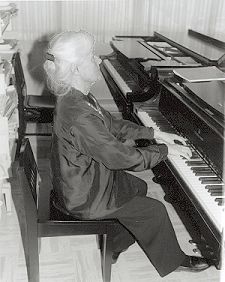 Professor Emerita Dr. Damjana Bratuž gave
an illustrated lecture and performance at the University
of Calgary. On the Shaman’s Trail ,
was part of a three-day Bartók Festival, “A
World of Contrasts, Commemorating the 60th Anniversary
of Bartók’s Death,” sponsored by
the Hungarian-Canadian Cultural Association in Calgary.
One of the organizers was Kieth Mullback,
BMus’72 . Professor Emerita Dr. Damjana Bratuž gave
an illustrated lecture and performance at the University
of Calgary. On the Shaman’s Trail ,
was part of a three-day Bartók Festival, “A
World of Contrasts, Commemorating the 60th Anniversary
of Bartók’s Death,” sponsored by
the Hungarian-Canadian Cultural Association in Calgary.
One of the organizers was Kieth Mullback,
BMus’72 .
Dr. Bratuž gave a presentation also in Washington,
D.C., during the AMS National Conference, at the Lyrica
Society for Word-Music Relations session. Her topic
was on the spoken Prologue to Bartók’s
opera Duke Bluebeard’s Castle. [Transgression
without Threshold: on the Missing, or Mistranslated
Bard’s Prologue in Béla Bartók’s
Duke Bluebeard’s Castle. ]
In recent seasons, Dr. Bratuž has also presented
papers at the Sorbonne, Paris, [Gestures
of Lament: the ‘Sostenuto e pesante’ Movement in Bartók’s
Piano Sonata]
and at the University of Chicago [Bartók’s “only
really true notations…[1943]” ].
Photo
by Y. S. Brownstone
Her article “Folklore and Transcendence” in
memory of Yves Lenoir, the late director of the Bartók
Archives at the Royal Library of Belgium, has appeared
in the RevueBelge de Musicologie (Vol.LVIII,
2004).

2005
-
Western News December 8, 2005 Vol 41 No.35
In Profile:
Damjana Bratuž is the kind of teacher
students will always remember. Page 7
“The questing spirit who changed lives”
Professor Emerita Damjana Bratuž is
celebrated as giving music students “a new
set of ears with which to hear music.”
By Paul Mayne, Western News
[In their published form all interviews omit most
of the contexts in which statements were made. I take
the opportunity to provide some parallel notes to Paul
Mayne’s text. Please click on each link to read
them. Damjana Bratuž]
"I'm not a theorist."
"I'm not a historian."
"I'm not a musicologist."
"I'm a performer." [1]
Performer, perhaps, is a modest description for Western Professor Emerita Damjana
Bratuž.
A dozen years into retirement, the multifaceted artist and musician continues
to be widely respected in the music-making profession, described as one whose
scholarly authority and imagination are equally alive. [2]
For Bratuž, the joy she receives from her music, in particular the work
of composer Béla Bartók (of whom she is a worldwide authority)
was not always at the forefront of her life.
Born in Italy, near the border of Austria and Slovenia, Bratuž grew up
in the shadow of dictatorship, suffering under the reign of Mussolini and the
Nazis.
"As a pianist I didn't develop easily or smoothly because of the war," says
Bratuž. "I was very gifted but my formative years were during the war.
I started at six, but they were horrible times."
She would find her way to America thanks to a Fulbright Award, to attend Indiana
University where she hoped to study radio and television. It was here that
her true talent was discovered.
"A charming Hungarian professor heard me play and he says 'why do you want
to do radio-television, you are a pianist'," says Bratuž.
[3]
How true that statement was. She would go on to become
the first woman to receive a Doctor of Music in piano
literature and performance from Indiana University.
Following her scholarship in America, Bratuž was required to return home,
but discovered she had nothing to go back to because her doctorate was not
recognized. Knowing a professor from London, Ont., Bratuž soon found
herself teaching music at Western in 1967 - Canada's centennial year. [4]
"For me this was a fairy tale," recalls Bratuž. "From my
background of dictatorship this was glorious." [5]
Her 25 years spent at Western celebrated not only her love of music, but the
interpretation and analysis of that music. At the time, Bratuž says
her methods were met with cynicism from some students. [6]
"Some had protested that I made them read," laughs Bratuž. "It
was my great dismay and sorrow to see the squandering of young talent. This was
something I never forgave. I [advocated hearing, knowing the music before analyzing
it]. [7]
"I [wanted them to realise that] they need to[be able to] defend their interpretation,
be articulate about the background of the music they are playing. I had students
with great pianistic talents that I [declined to keep in my class] because of
that." [8]
One graduate of Bratuž who admits he was skeptical was David Stabler (MusB'75).
Yet upon reflection, Stabler is thankful for the guidance he received from
Bratuž.
"Many of us have had teachers who changed our lives - someone whose wisdom
and caring fundamentally altered the way we think, feel and look at the world," says
Stabler. "For me, and for many other music students at Western, that teacher
was Damjana Bratuž."
Stabler adds from the moment he auditioned for her
on a wintry March morning, Bratuž became "the centre of my gravity". His weekly piano lesson
with her wasn't just the highlight of his week - it was his week.
"She demanded the highest standards and introduced a new system of learning,
with new vocabulary and new meanings," says Stabler, now a music critic
for a newspaper in Portland, Oregon. "Actually, what she did was give us
a new set of ears with which to hear music."
Bratuž believed that her students should wade into the stream of culture
that surrounded and created great works of classical music. Stabler recalls
her often taking a carload of students to Toronto in her enormous blue Buick
to hear great artists of the day. [9]
"Professor Bratuž didn't teach to our limitations but to our imaginations," says
Stabler. "If we didn't grasp a concept, she would say 'in 20 years you'll
understand'. I'm just beginning to."
Bratuž continues to enjoy retirement, saying
the validation of her work has "seemed to come
over the last dozens years."
"These have been the best years, not only in engagements, but encounters
in my field," says Bratuž, who spends much of her time speaking and
performing internationally. "I think the thing that marked me the most was
the war. It tells me not to miss what life brings you."
What it has brought Bratuž is sense of calm and confirmation that her
restless and pioneering intellect continues to make her a forerunner as a truly
postmodern mind.
Name: Damjana
Bratuž
Born: Gorizia, Italy
Education: Doctor
of Music in Piano Literature and Performance,
with a Minor in Radio & Television,
Indiana University (1967) Previous degrees,
diplomas, and certificates: St.Louis, Paris,
Salzburg, Trieste.
At Western: taught
Piano, Piano Literature, History (Bartók),
Theory, Vocal Literature, Italian Diction.
Introduced an interdisciplinary Course in
Musical Semiotics at the Centre for the Study
of Theory and Criticism (1992). Founded with
cellist Tsuyoshi Tsutsumi renowned classes
in Style & Interpretation. Created popular
courses for non-music majors.
Accomplishments: Awarded
research grant by Italian Government (University
of Bologna, 1989-90). Received Bartók
Centenary Award from Hungarian Government
(1981). As performer, lecturer, adjudicator,
has appeared across Canada. Gives seminars
and recitals in Finland, Italy, New Zealand
and the United States. |
|
|
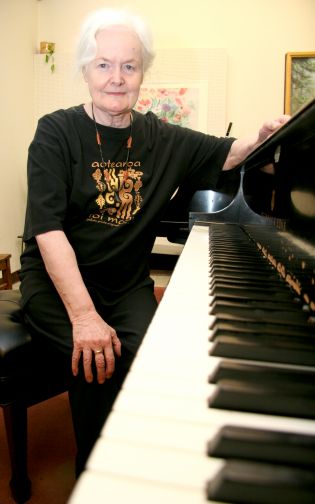 |
[1] forthcoming
[2]
[3]
[4]
[5]
[6]
[7]
[8]
[9]
[10]

American Musicological
Society Conference, Washington
D.C.
Conference Paper: Transgression without Threshold:
on the Missing, or Mistranslated Bard’s Prologue in
Béla Bartók’s Duke Bluebeard’s
Castle (see
Bartókiana - Abstracts). Presented at
the Lyrica Society for Word-Music Relations Session.
[http://ces.fas.harvard.edu/people/affiliates/docs/lyrica.pdf]
Profile : Damjana Bratuž is
Professor Emeritus at the University of Western Ontario
in London, Canada. She is one of the country’s
three musicians (with Zoltán Székely
and Árpád Joó) who were awarded
the Bartók Centenary Diploma and Memorial
Plaque by the Hungarian Republic, for their activité créatrice[qui]a
grandement contribué à la connaissance
de l’oeuvre de Béla Bartók.
Her research had begun in the 1960s at Indiana University
where she obtained her Doctorate in Piano Literature
and Performance.
She had been awarded a Fulbright grant as a student
from Italy [for a musical series for children she had
created at Radio Trieste] and her academic life came
full circle in 1990, when as a Canadian professor she
received a grant from the Italian Government for research
at the Semiotics Department of the University of Bologna.
The multidisciplinary subjects of her conference
papers, seminars and recitals, reflect her interest
in the semiotics of performance; e.g., “Gestures
of Lament “ (ICMS-8, Sorbonne, Paris,
2004); “Symbolic
Gestures in the Performance of Clementi’s Didone
abbandonata” (University of Toronto, 2004); “Musical
Performance and the Dialogic Imagination” (a
series of ten seminars, University of Helsinki, 2000); Le
connessioni invisibili: The Harvard Lectures of Bartók
[1943] and Calvino [1985] (University of Auckland,
New Zealand); “Comme de longs échos: Reflections
on Bartók, Rilke and Brancusi (Conference
in Honour of Thomas Sebeok, Budapest); “On
the Embodiment of Form:Polychronic Movement
in Flaubert and Debussy” ICMS-6, Aix-en-Provence); “On
the Creation of One’s Own Precursors:” Piano
Recital of Liszt and Bartók Works (ISI, Imatra,
Finland).
Although her university courses involved piano performance
and literature, Damjana Bratuž delighted in
teaching occasionally also Vocal Literature - and
Italian diction. (At Indiana University in the 1960s
she had taken the opportunity to study voice.)
The Hungarian-Canadian
Cultural Association Presents:
A World of Contrasts
Commemorating
the 60th Anniversary of Bartók's Death.
University of Calgary.
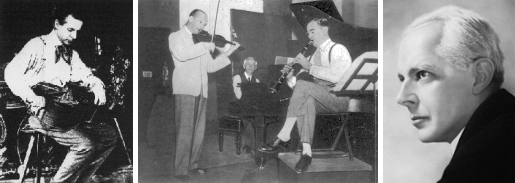
Béla Bartók
1881- 1945
Bartók Celebration Events:
Opening Concert Oct.17
Bartók
Piano Competition Oct. 19
Lecture
Recital Oct. 20
Lecture Recital, October 20th 2005. Boris
Roubakine Recital Hall.
Profile: Damjana Bratuz is, with
Zoltán
Székely
and Árpád
Joó, one of the three musicians in Canada
who were awarded the Bartók Centenary Diploma
and Memorial Plaque by the Hungarian Republic for
their activité créatrice
[qui] a grandement contribute à la connaissance
de l’oeuvre de Béla Bartók.
Hungarian musicologist Bence Szabolsci praised the
novelty and he value of her earliest investigations,
carried out in the 1960s at Indiana University. It
was there that Damjana Bratuz first came across Bartók’s
recorded collections of peasant music and began to
trace the original idiom behind the composer’s
scores.
Since then, throughout her academic career in Canada,
her study developed into a vast, imaginative inquire,
faithful always to a performer’s task and point
of view, that is, to examine, and contribute to,
the reception of
Bartók’s music. In piano teaching, her
approach has represented in György Sebök’s
words “a unique pedagogical help in the field, “one
in which the analysis of Bartók’s musical
material shared the results of her studies in illustrated
programmes with a wide range of audiences, from the
academic world to the general public, from major
international centres to small Canadian communities.
Her academic life came full circle when she received
a research grant from the Italian Government for study
at the Semiotics Department of the University of Bologna
[she had to come to these shores as a student, with
and American grant awarded for a musical series for
children she had created at Radio Trieste, Italy].
Recent engagements in Italy have included courses,
lectures and performances: e.g., in the University
of bologna series La Musica nella Storia e nella
Cultura, in the seminars “Incontri col
Maestro” at the Accademia Pianistica di
Imolaa, in the ‘Bartók and Berio’ programs
of the Altrisuoni series sponsored by the Gramsci
Institute (Marche), and in the “Musica e Spazio” programs
created at the Parma Conservatory.
In these past seasons Damjana Bratuz has presented
papers in bartókian musical semiotics at international
conferences, most recently at the Sorbonne in Paris
(Gestures of Lament), at the University of
Chicago (on Notation), at Goldsmiths college
in London (on the Sound-Spectrum), as well
as in Leuven (Belgium), Bologna, Imatra (Finland),
and Aix-en-Provence.
Her larger interdisciplinary projects have been
structured and offered in various formats: Musical
Performance and the Dialogic Imagination as
a series of ten seminars at the University of Helsinki; The
Harvard Lectures of Bartók (1943) and Calvino
(1985) as
a seminar a the University of Ottawa, as a paper
at the International Colloquium on Calvino at the
University of Toronto, and as an illustrated lecture
at the University of Auckland in the New Zealand;
excerpts from Comme
de longs échos, reflections on Bartók,
Rilke and Brancusi, have been presented at conferences
at Indiana University, in Budapest, and at the Accademia
delle Belle Arti in Bologna.
On the Shaman's Trail
Out Doors
[Im Freien, Szabadban]
Sippal, Dobbal ... [With Pipes and Drums]
Barcarolla
Musettes
The Night's Music
The Chase
This presentation brings together material Damjana
Bratuz has discussed in various programs devoted to
the shamanic traces in Bartók’s
music, the most recent one being a paper give at the
International Musicological Society conference in Leuven,
Belgium (2002) under the mysterious title “…a
sign, a summons, a wink.”
The title was borrowed from a page by Calvino, a
meditation on coincidence on things that “present
themselves” and
ask for attention and observation. Calvino’s
three terms remain the thread linking the observations
in The Shaman’s Trail. Pianists are
used to the summons of the composer’s
indications as their guidance to the score. However,
when the performer is ethnically and linguistically
removed from the composer’s background, the
task becomes one of the observing what one does not know,
rather than of applying familiar relationships.
“By coincidence the edition of Szabadban that
came first into my hands was the old Universal which
gave the pieces’ titles in three languages.
Thus the first title, Sippal, dobbal was
followed by three dots: “…” that were missing
in the English and German translation. A Hungarian
child would have known the text referred to; I could
only recall having encountered those foreign terms
during the preparation of my thesis on Bartók
when at Indiana University I examined the collections
of hundreds of Hungarian folk tunes (Bratuz, 1967).
When later I did retrieve the text I sensed its great
mythical import and ‘healing’ shamanic connotations,
but only after a few years, by coincidence, I also
found confirmation for it (Viski, 1932).”
The shamanic resonance of such Regös (winter
solstice) songs were mentioned by Bartók, when
he tried to call the world’s attention to these “relics
from pagan times!” (Colinde, 1931)
Throughout the five pieces of the Out Doors suite,
ancient kinetic and gestural patterns call the attention
of a pianist’s hand and ear. The aim of this
program is to make them audible.

2004 - List of presentations given as Pianist and
as Lecturer
…a playing of great wisdom and
warmth…
‘A Semiotic Concert’ - Etelä-Saimaa,
Imatra, Finland
Photo by Y. S. Brownstone
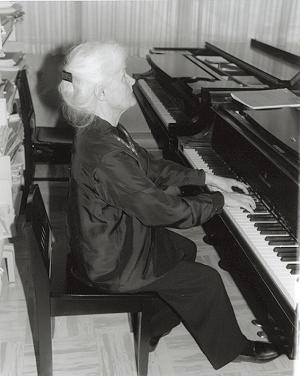
Her playing had authority and
insight… ‘Viva
Bartók’- Monday Magazine, Victoria,
Canada
…an ecstatic and enchanting
performance of Liszt, that conveyed the depth and
the message of the music. …Inspiring, sovereign
playing. Glasilo/The Voice,
Toronto, Canada
…The world of Béla
Bartók was presented by one of the most profoundly
knowledgeable international scholars, with spirit,
in a manner that was both informal and masterful … Bartók
had sought the artistic means to restore a living
and genuine contact with humankind. Probably this
is what echoed in Dr.Bratuž’s words when
she said in passing that playing was for her “a
dialogue with the composer, a dialogue with the instrument,
a dialogue with the listener.” ‘Memory
and Roots’ – Novi Glas, Gorizia, Italy
- “LISZT AND BARTÓK:
FROM FOLK INSTRUMENTS TO ART MUSIC” (Lecture-Recital) (‘THE
SECRETS OF INSTRUMENTS” Series, Helsinki University
2000)
- “INVISIBLE GEOMETRY: THE
BODY AND MUSICAL PERFORMANCE” (Lecture-Recital)
… a wonderful example of the power of the speaking body…Even
someone who did not understand English could have followed perfectly what she
was saying, through her gestures, her lively voice, and her interaction with
the audience. Through the entire performance she offered inspiration and light,
transmitting joy.” (Conference on The
Language of the Body, Semiotic Winter Institute, Imatra, Finland)
‘Professor- pianist Damjana Bratuž, a living example of the power
of the speaking body’ – Etelä-Saimaa 2000
Series of seminars, recitals,
master classes:
MUSICA E SPAZIO, Conservatorio A.Boito,
Parma, Italy 2000;
ALTRISUONI –L’INVENZIONE
DEL NUOVO NELLA MUSICA DEL NOVECENTO: BÉLA BARTÓK
E LUCIANO BERIO, Istituto Gramsci Marche/Conservatorio
di Pesaro, Italy.
INCONTRI COL MAESTRO, Docente
di Seminario, Accademia Pianistica, Imola, Italy.
MUSIC AND LITERATURE (Lecture
and Recital), University of Auckland, New Zealand.
- Damjana Bratuž -
Lecturer
Topics on the semiotics of musical
performance (conference papers, Power Point presentations,
seminars, mini-courses):
- “SYMBOL AND REVERBERATION:
PATTERNS OF RE/COGNITION IN THE WORK OF BARTÓK,
RILKE AND BRANCUSI” (Budapest,
Hungary)
- “ANACRUSIS AS A SIGN OF
OTHERNESS: TWO READINGS OF BÉLA BARTÓK’S IMPROVISATIONS” (Sigharting,
Austria)
“fascinating contributions…I
found your remarks, on both occasions, splendid”
Thomas A. Sebeok
La Sala dei Marmi,
Conservatorio G.Rossini, Pesaro, Italy
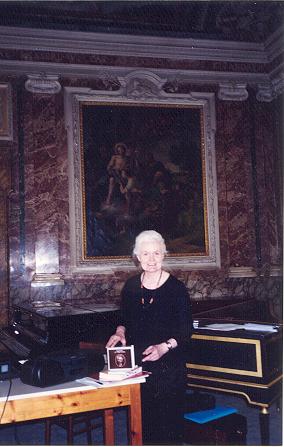 -“SYMBOLIC
GESTURES IN THE PERFORMANCE OF CLEMENTI’S Didone abbandonata” (University
of Toronto 2004) -“SYMBOLIC
GESTURES IN THE PERFORMANCE OF CLEMENTI’S Didone abbandonata” (University
of Toronto 2004)
- “ON BARTÓK’S ‘only
really true notations’ [1943]” (University
of Chicago 2004)
-“ON PROVENANCE AND FILIATION:
FROM COMPARATIVE MUSICOLOGY (BARTÓK) TO Le affinità primitive (ECO) (University
of Ottawa 2003)
-“Le connessioni invisibili:
A MUSICIAN’S READING OF CALVINO (International
Colloquium “Italo Calvino: Lightness and Multiplicity,” University
of Toronto 2003)
- “a sign, a summons,
a wink”: SHAMANIC TRACES IN BARTÓK’S
SZABADBAN “ (Katholieke
Universiteit, Leuven, Belgium 2002)
“…passionnant!” Yves Lenoir
-“THE urtümliches
Klangspektrum IN BARTÓK’S PIANO
MUSIC” (Goldsmiths
College, London 2001)
-“REPENSER LES FRONTIÈRES
DE BARTÓK” (Université de
Laval, Québec 2001)
-“LE HARVARD LECTURES DI
BARTÓK (1943) E CALVINO (1985)” Interdisciplinary
courses on La Musica nella Storia e nella Cultura (University
of Bologna 2000)
- “ON THE EMBODIMENT OF
FORM: POLICHRONIC MOVEMENT IN FLAUBERT AND DEBUSSY” (Université de
Provence, Aix-en-Provence)
“MUSICAL PERFORMANCE AND
THE DIALOGIC IMAGINATION” -
a series of twelve seminars (Helsinki University
2000)
Download/view Brochure -
in Adobe Acrobat (PDF) Format
Download/view
Brochure Insert - in Adobe Acrobat
(PDF) Format
 Get
a free copy of the Adobe Acrobat Reader Get
a free copy of the Adobe Acrobat Reader

1999
[From The Glenn Gould Journal, Volume 5/Number
1, Spring 1999 ("Presence of Glenn Gould: The Italian
Perspective," by Damjana Bratuz)]
See Glenn
Gould Essay in original version

1993
- An Die Musik: A Former Student Pays Tribute
To Professor Damjana Bratuz
Many of us have had teachers
who changed our lives- someone whose wisdom and caring
fundamentally altered the way we think, feel and look
at the world. For me, and for many other music students
at Western, that teacher was Damjana Bratuz.
Professor Bratuz, who retired in April from the faculty
of music after 25 years, was the reason I attended Western.
From the moment I auditioned for her on a wintry March
morning, she became the centre of my gravity. My weekly
piano lesson with her wasn't just the highlight of the
week: it was the week. She demanded the highest standards
and introduced a new system of learning, with new vocabulary
and new meanings. Actually what she did was give us
a new set of ears with which to hear music. A scale
wasn't just a scale any more. It was a "Mozart scale"
or a "Debussy scale." A trill had infinite expressive
potential: a Chopin arpeggio bloomed with its own romantic
will.
I'll never forget a lesson just after Christmas of
my sophomore year. I had practised through the vacation
and was ready to surprise her with several new pieces.
I was sure she'd be impressed. Well, if she was, she
didn't show it. She began to dissect my Bach fugue,
asking me to pick out its separate lines and play each
one. I stumbled around and stopped. I'd learned them
all in a jumble, all wrong. Then I played some Mozart.
I remember my shock when she asked me to stop playing
and conduct the music instead. I felt as if she'd just
asked me to juggle six oranges and two watermelons.
Blood rushed to my face. Sensing my rising frustration,
Professor Bratuz leaned over from her position at the
second piano and said, almost in triumph, "Use your
anger! Anger is good. Use it!"
Like the best teachers, Professor Bratuz's greatest
wish was that we become our own pilots. Our charter
territory was the classical piano repertory of the past
three centuries, which stretched before us as distant
and unfamiliar as the far shores of Lake Ontario. From
the joyful exuberance of Bach to the ear-bending angst
of Karlheinz Stockhausen, Professor Bratuz introduced
us to one masterpiece after another.
Professor Bratuz, who was born where the countries
of Austria, Italy and Slovenia converge, has never lost
her passion for multiculturalism. That's what attracted
her to Canada in the first place. Three decades in North
America have not diluted her European manner or her
colorful accent. Her voice is as musical as Mozart in
any of four languages. And she remains a restless, pioneering
intellect. In 1958, she won a Fulbright Scholarship
to study in the United States and became the first woman
and Italian citizen to earn a doctorate degree in music
from the University of Indiana in Bloomington. Her life
came full circle, she says, when she returned to Italy
in 1989, this time as a Canadian citizen and senior
professor, to continue her lifelong study in the aesthetics
of music at the University of Bologne. Her plans after
leaving Western include performing and giving lecture/recitals
throughout North America and abroad.
Professor Bratuz believed that her students should
not just dabble but wade into the some stream of culture
that surrounded and created the great works of classical
music. Many of us, fresh from rural Ontario, had never
seen an opera or heard a live orchestra when we entered
Western. To remedy our deficiencies, Professor Bratuz
would bring books on art, philosophy and psychology
to lessons. Symbols and the roots of creativity have
always fascinated her, Often she would take a carload
of students to Toronto in her enormous blue Buick to
hear the great artists of the day: Artur Rubinstein,
Maurizio Pollini, Rodu Lupu, Alfred Brendel. We would
leave London in the morning and spend a couple of hours
in the bookstores along Bloor Street. Then we would
have supper upstairs at the Cafe de la Paix, where Professor
Bratuz would order things in French for us to try. After
the concert she would take us backstage to meet the
artists.
Slowly, over our four years with Professor B., we began
to change. Less satisfied, more curious, more disciplined,
we started to shed like old clothes our laziness and
ignorance and set out on the road to becoming rnusicians-a
road that has no end. She got us to see ourselves as
heirs to an enormously rich heritage and to feel the
burden of that responsibility. Professor Bratuz's foreign
world of pianistic colors and physical gestures was
becoming familiar. Although I do not perform today,
I use her teachings in my work as a music critic for
a newspaper in Portland, Oregon. I try to listen with
her ears because she hears better than anyone I know.
Her wish that we be our own pilots has come true for
many of her students. Some of us ventured to Europe
on our own, to study and soak up the culture. Several
former students have grown into respected performers
and recording artists. Some are teachers, passing on
her principles which she came by through years of thought
and practice. Others, like myself, earn our living on
the periphery of music, but remain musicians at heart.
As Heather Morrison MusB'75, a former student, said
not too long ago: "She made me realize that it isn't
possible to separate music from the process of life."
Professor Bratuz didn't teach to our limitations but
to our imaginations. She guided us with her eyes firmly
on that far share. If we didn't grasp a concept, she
would say, "In 20 years you'll understand."
For me, its been 20 years. I'm just beginning to.
by David Stabler MusB'75
Western Alumni Gazette
Fall 1993, p. 25

Site Updated:
September 26, 2023
|